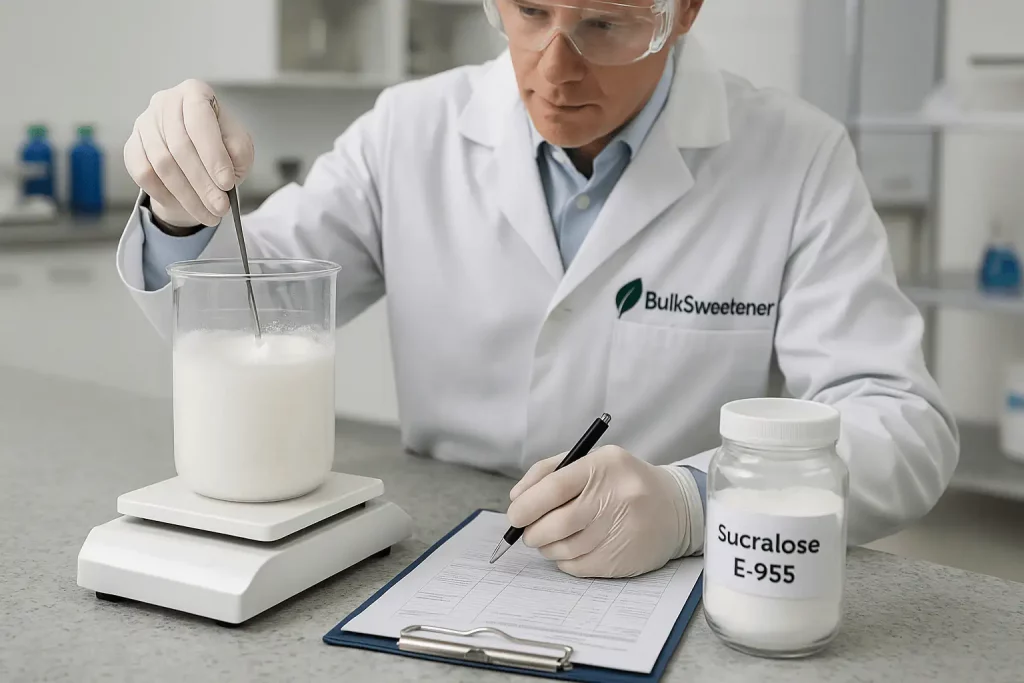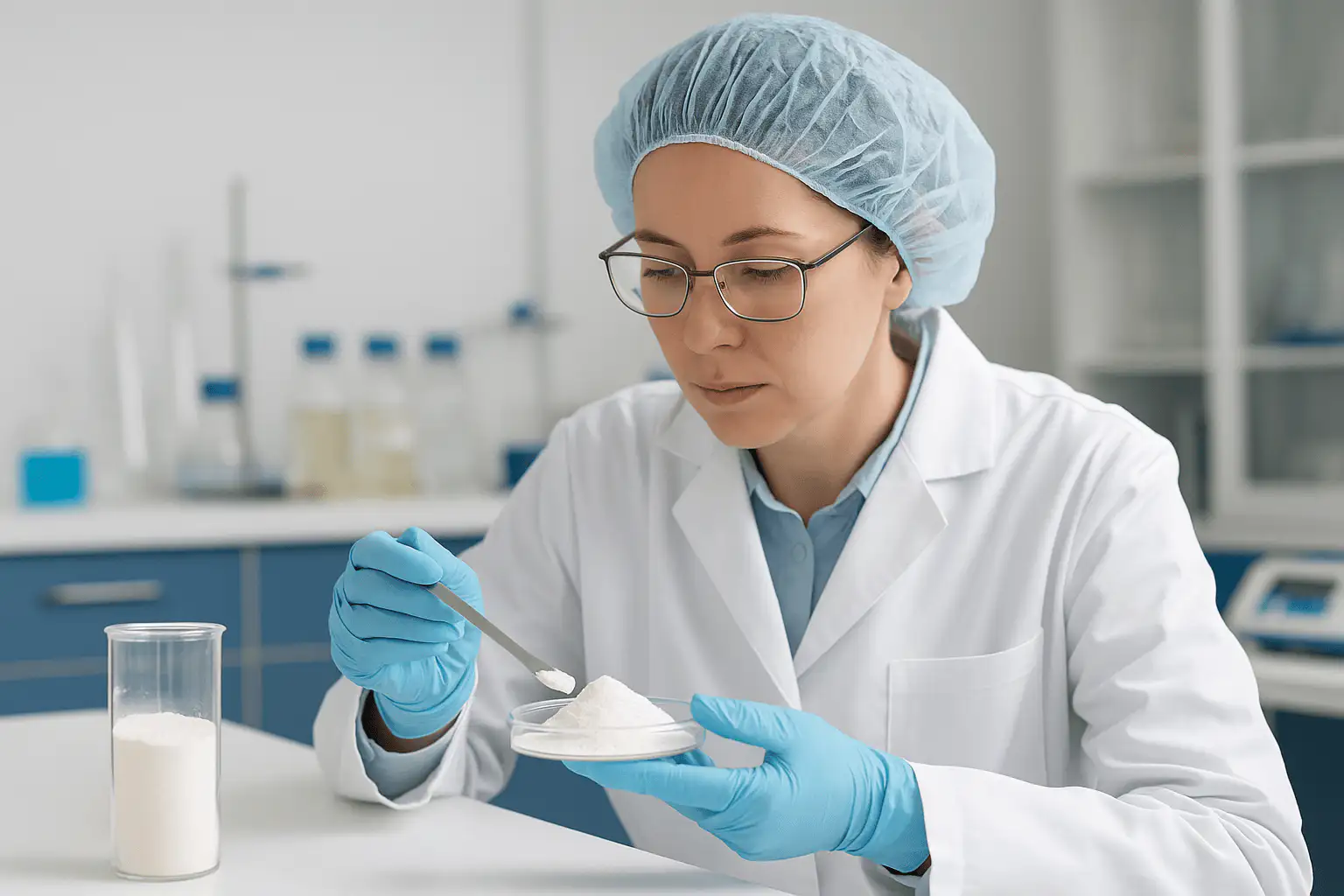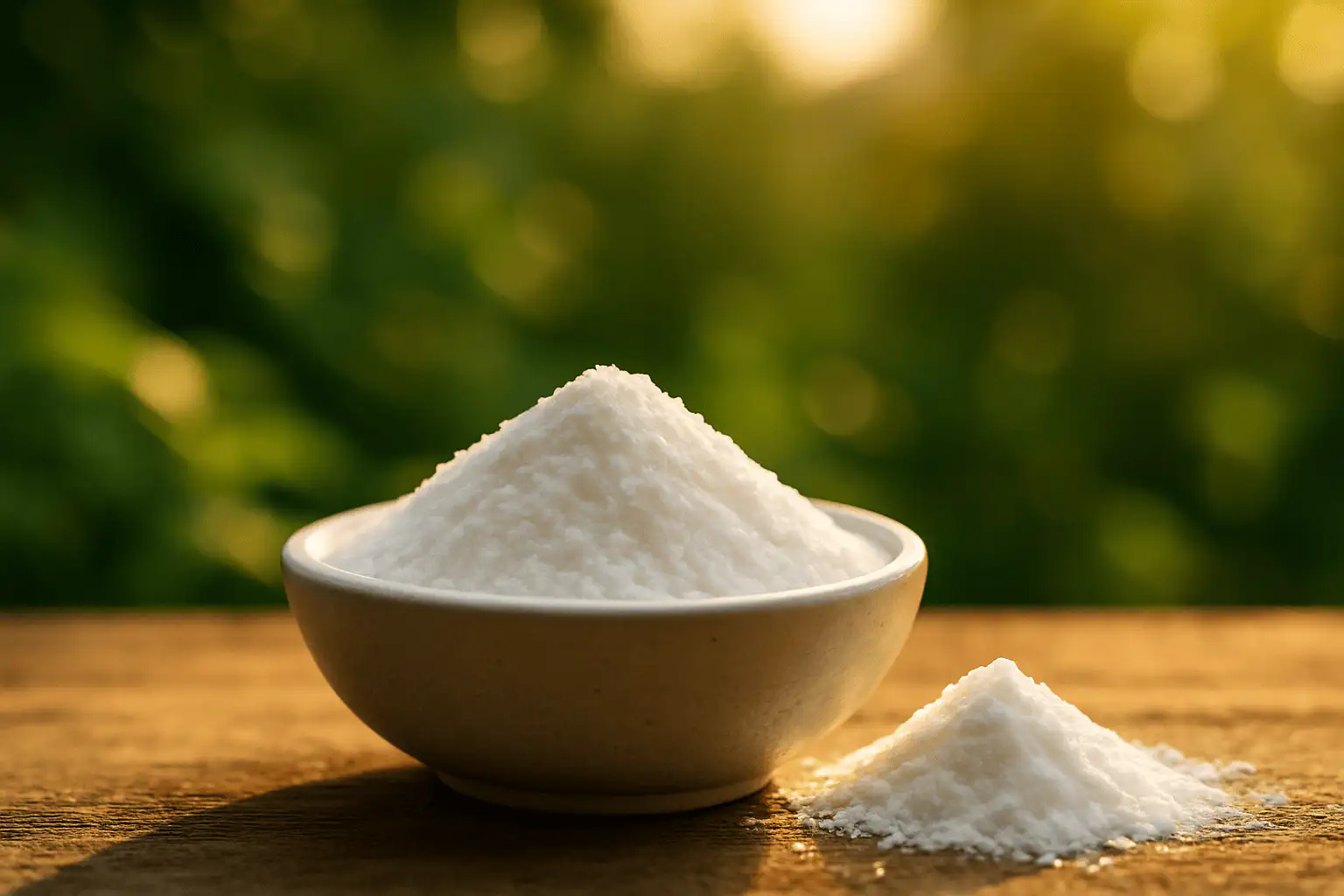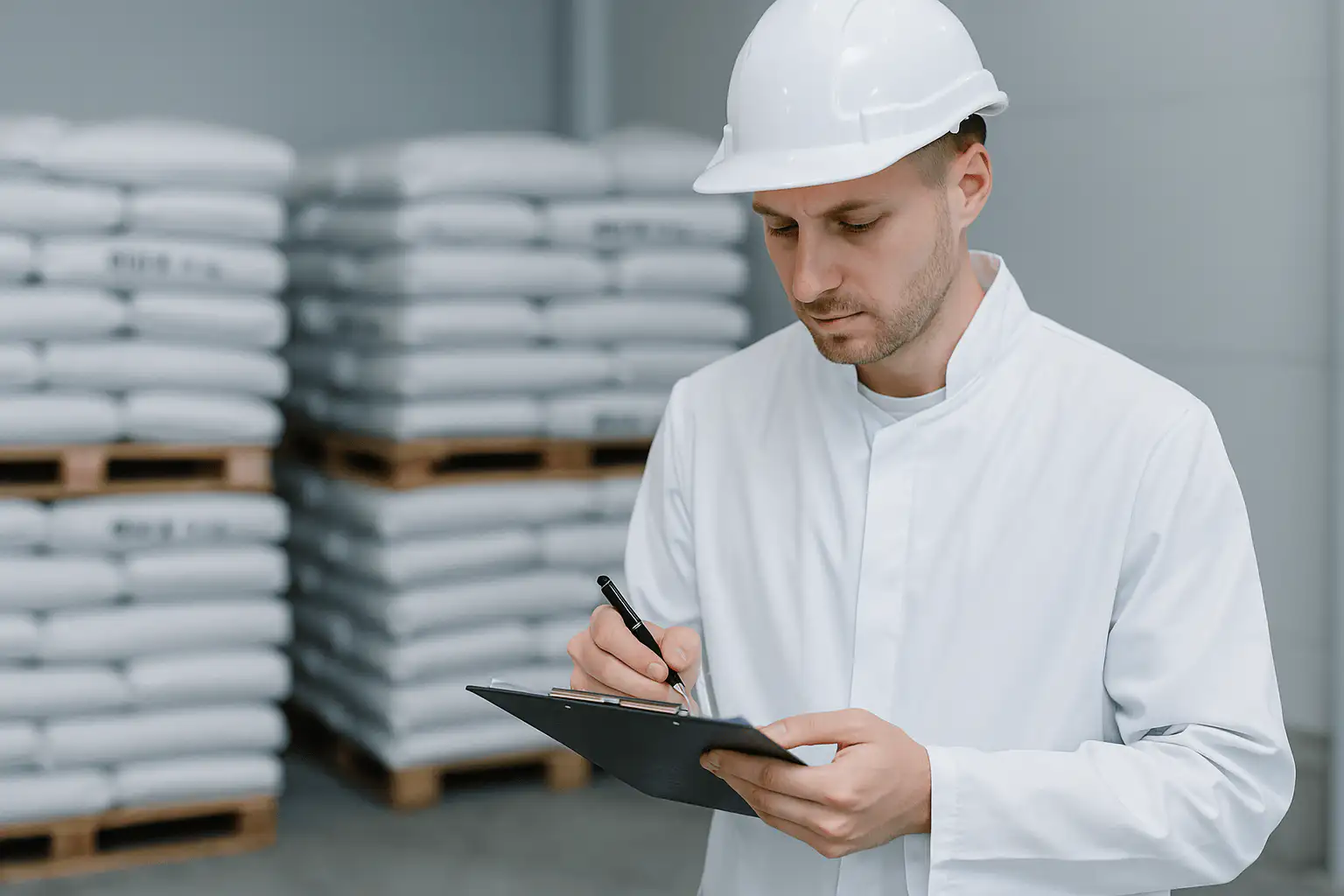Bulk Sucralose for industry: consistent quality and reliable supply
If you’re evaluating bulk sucralose—sucralose bulk powder, sucralose sweetener bulk, or planning to buy sucralose in bulk—we supply stable lots with documented specs. Tight PSD, low moisture, and clean dissolution for beverages, confectionery, bakery, and dairy. Ask for sucralose bulk price by grade and particle size. COA/TDS per lot. EU/UK/LATAM shipping with industrial support and batch traceability.


Formulation Tech Support

Competitive Prices

Natural Taste

Full batch traceability
The risks of buying bulk sucralose without standards
- Sweetness variability and PSD drift between lots
- Moisture issues leading to caking or flow problems
- Irregular dissolution and visible specks in beverages
We qualify sources, control particle size via calibrated sieving/milling, and cap moisture to spec. Each lot is QC-checked for assay/purity, pH, moisture, heavy metals, and microbiology, then released with COA/TDS. Result: predictable sweetness, clean dissolution, fewer reworks.

Key Technical Specifications — Bulk Sucralose (E955)
| Category | Specification | Details |
|---|---|---|
| Chemistry | Assay (sucralose) | 98.0–102.0% on anhydrous basis (FCC/USP compliant) |
| Relative sweetness (vs sucrose) | ~600× (observed 400–800×, application-dependent) | |
| pH (10% aqueous solution) | 5.0–8.0 (typically near neutral) | |
| Chemical ID | CAS 56038-13-2 · E955; chlorinated sucrose derivative | |
| Physical | Loss on drying (moisture) | ≤2.0% |
| Residue on ignition (ash) | ≤0.7% | |
| Solubility in water (20 °C) | ~28–30 g/L (≈2.8–3.0% w/v); dissolves readily — sparingly soluble in ethanol | |
| Stability | Thermal | Stable in pasteurization/UHT; decomposition with prolonged heating >~120–130 °C (baking stability is time/formulation-dependent) |
| pH range | Stable approximately pH 3–8; degradation increases outside this range | |
| Hygroscopicity | Low–moderate; store cool and dry (<60% RH) | |
| Quality | Allergens | None expected (does not contain gluten, soy, nuts, dairy) |
| GMO | Non-GMO product available | |
| Heavy metals | Complies with food-grade limits (e.g., Pb < 1 mg/kg) | |
| Origin / process | Produced from sucrose via selective chlorination and purification | |
| Documents | COA, TDS, MSDS available on request | |
Key Technical Specifications — Bulk Sucralose (E955)
| Category | Specification | Details |
|---|---|---|
| Chemistry | Assay (sucralose) | 98.0–102.0% on anhydrous basis (FCC/USP compliant) |
| Relative sweetness (vs sucrose) | ~600× (observed 400–800×, application-dependent) | |
| pH (10% aqueous solution) | 5.0–8.0 (typically near neutral) | |
| Chemical ID | CAS 56038-13-2 · E955; chlorinated sucrose derivative | |
| Physical | Loss on drying (moisture) | ≤2.0% |
| Residue on ignition (ash) | ≤0.7% | |
| Solubility in water (20 °C) | ~28–30 g/L (≈2.8–3.0% w/v); dissolves readily — sparingly soluble in ethanol | |
| Stability | Thermal | Stable in pasteurization/UHT; decomposition with prolonged heating >~120–130 °C (baking stability is time/formulation-dependent) |
| pH range | Stable approximately pH 3–8; degradation increases outside this range | |
| Hygroscopicity | Low–moderate; store cool and dry (<60% RH) | |
| Quality | Allergens | None expected (does not contain gluten, soy, nuts, dairy) |
| GMO | Non-GMO product available | |
| Heavy metals | Complies with food-grade limits (e.g., Pb < 1 mg/kg) | |
| Origin / process | Produced from sucrose via selective chlorination and purification | |
| Documents | COA, TDS, MSDS available on request | |
Client testimonials and reviews
Bara Ezquerra
At Bara Ezquerra we work with Bulksweetener for our stevia, and the quality is excellent: clean taste, no aftertaste, and very consistent. We pack it in sticks for our HORECA clients and they’re very happy; they reorder and appreciate the presentation and product consistency.
Cacao Delta
After testing several options, Cacao Delta chose Bulksweetener’s stevia blend: balanced sweetness that preserves the cocoa notes. It performs beautifully in tempering, baking, and fillings, with no recrystallization or aftertaste. It’s the perfect solution for our bars and bonbons.
Acasyna
For our jams, Bulksweetener’s stevia blend works beautifully: it sweetens without masking the fruit and keeps a uniform consistency even after months in storage. No syneresis, no crystallization, and a clean taste. At Acasyna, we’re very satisfied.
Oroyes
As a food distributor, Oroyes brings Bulksweetener sweeteners to the retail channel and the brand practically sells itself: it’s well-known, trusted, and moves quickly on shelves. Product quality is consistent, and our customers reorder it regularly.
Frequently Asked Questions — Bulk Sucralose
What is the typical sweetness level of sucralose?
Sucralose delivers ~600× the sweetness of sucrose on a weight basis. In bulk sucralose applications this allows very low inclusion rates, helping reduce cost-in-use and calorie load while maintaining a clean, sugar-like sweetness profile across beverages, dairy, confectionery, and bakery.
How does particle size affect dissolution for sucralose bulk powder?
Particle size (PSD/mesh) impacts both dissolution speed and dusting. Finer PSD (e.g., 120–200 mesh) dissolves faster and is preferred for instant beverages and syrups. Slightly coarser PSD can improve flow in dry-blend lines. Specifying PSD when you buy sucralose in bulk helps achieve consistent processing across plants.
Is sucralose heat-stable in baking and UHT?
Yes—sucralose is heat-stable under common food processes (pasteurization, UHT, and typical baking times/temperatures). At extreme heat or prolonged exposure some loss can occur, but in standard sucralose sweetener bulk use (cakes, cookies, RTD heat steps) sweetness retention is high and sensory remains clean.
What is the sucralose manufacturing process at a high level?
Commercial sucralose is produced via a multi-step synthesis from sucrose, including selective chlorination (substituting three hydroxyls), protection/deprotection, purification and crystallization. Final sucralose bulk powder is highly purified, food-grade material released against assay, moisture, pH, heavy metals and micro specs.
Does sucralose contain allergens or gluten?
No. Sucralose is not a known major allergen and is naturally gluten-free. Allergen/gluten status in finished goods depends on the facility and any carriers used in blends; pure bulk sucralose (assay grade) does not contribute common allergens or gluten.
Do you offer Non-GMO options and full documentation (COA/TDS/SDS)?
Market supply commonly includes Non-GMO statements for bulk sucralose. Industrial buyers typically request COA per lot, TDS (specs: assay, moisture, PSD), and SDS for handling. Requesting documents up front streamlines approvals when you buy sucralose in bulk.
What drives sucralose bulk price and lead times?
Sucralose bulk price depends on grade/assay, PSD (mesh), certifications (e.g., Non-GMO, Kosher/Halal), packaging (25-kg vs big-bag), MOQ, Incoterms (EXW/FCA/DAP), destination, seasonality, and freight/currency. Clear specs and forecasted volumes help secure stable pricing and reliable lead times.
How should bulk sucralose be stored (moisture/RH)?
Store bulk sucralose sealed, cool, and dry (typically <60% RH), away from volatiles and light. Keep bags on clean pallets, use FIFO, and minimize temperature/humidity swings to prevent caking and to maintain assay and flow properties over shelf life.
What are typical use levels of sucralose in formulations?
Because sucralose is ~600× sweeter, inclusion is very low—often 10–200 ppm depending on application, sweetness target, and matrix effects. In reduced-sugar foods, formulators frequently pair sucralose sweetener bulk with polyols (e.g., erythritol) or fibers to rebuild mouthfeel and sweetness timing.
What is the ADI (acceptable daily intake) and regulatory status?
Major authorities (e.g., JECFA/EFSA/FDA) recognize sucralose as safe within established limits; the ADI is commonly cited at 5 mg/kg body weight/day. This supports wide global use of bulk sucralose across categories when formulated according to local regulations and good manufacturing practices.
